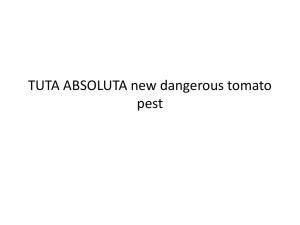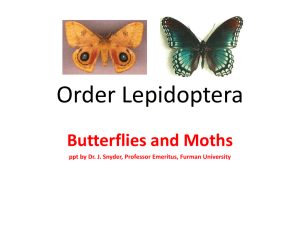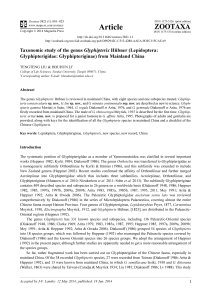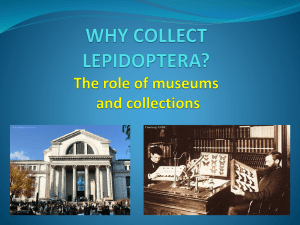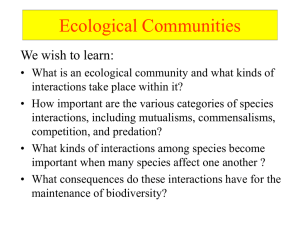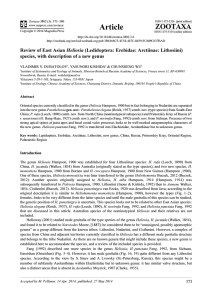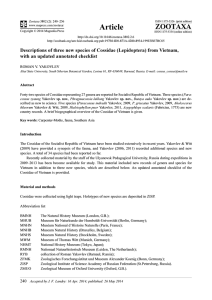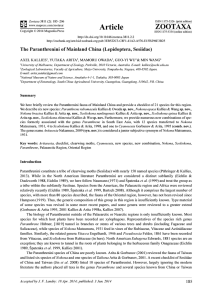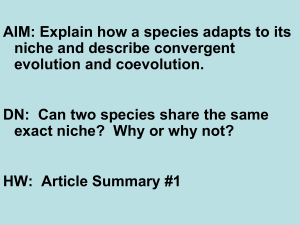Preview - Magnolia Press
advertisement
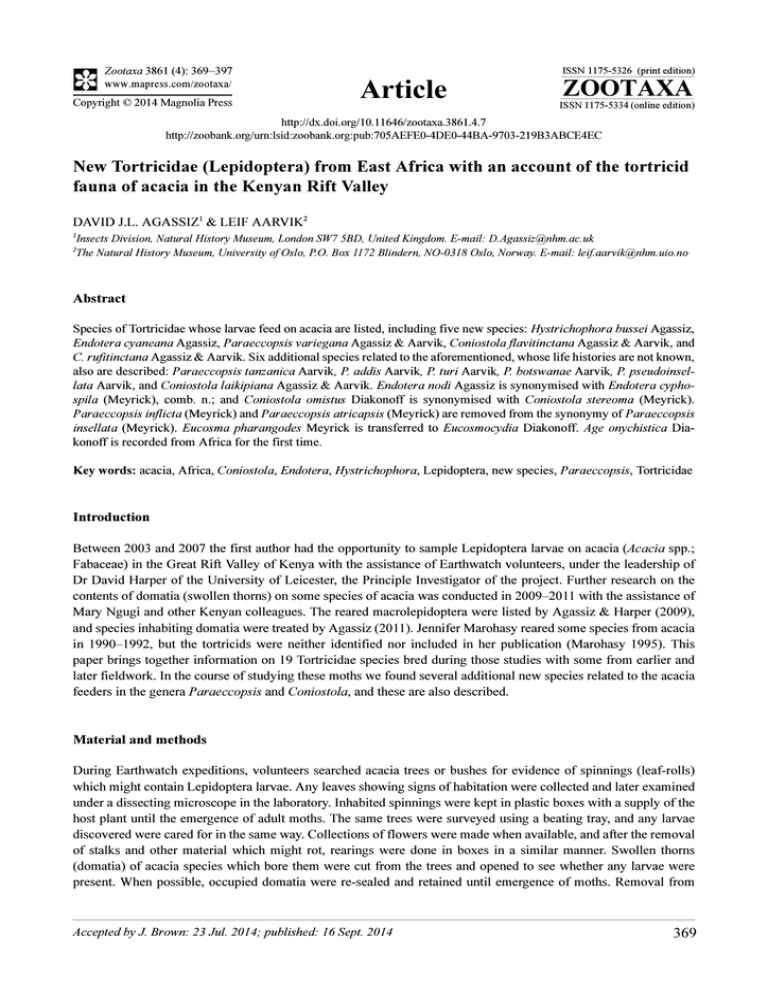
Zootaxa 3861 (4): 369–397 www.mapress.com /zootaxa / Copyright © 2014 Magnolia Press Article ISSN 1175-5326 (print edition) ZOOTAXA ISSN 1175-5334 (online edition) http://dx.doi.org/10.11646/zootaxa.3861.4.7 http://zoobank.org/urn:lsid:zoobank.org:pub:705AEFE0-4DE0-44BA-9703-219B3ABCE4EC New Tortricidae (Lepidoptera) from East Africa with an account of the tortricid fauna of acacia in the Kenyan Rift Valley DAVID J.L. AGASSIZ1 & LEIF AARVIK2 1 Insects Division, Natural History Museum, London SW7 5BD, United Kingdom. E-mail: D.Agassiz@nhm.ac.uk The Natural History Museum, University of Oslo, P.O. Box 1172 Blindern, NO-0318 Oslo, Norway. E-mail: leif.aarvik@nhm.uio.no 2 Abstract Species of Tortricidae whose larvae feed on acacia are listed, including five new species: Hystrichophora bussei Agassiz, Endotera cyaneana Agassiz, Paraeccopsis variegana Agassiz & Aarvik, Coniostola flavitinctana Agassiz & Aarvik, and C. rufitinctana Agassiz & Aarvik. Six additional species related to the aforementioned, whose life histories are not known, also are described: Paraeccopsis tanzanica Aarvik, P. addis Aarvik, P. turi Aarvik, P. botswanae Aarvik, P. pseudoinsellata Aarvik, and Coniostola laikipiana Agassiz & Aarvik. Endotera nodi Agassiz is synonymised with Endotera cyphospila (Meyrick), comb. n.; and Coniostola omistus Diakonoff is synonymised with Coniostola stereoma (Meyrick). Paraeccopsis inflicta (Meyrick) and Paraeccopsis atricapsis (Meyrick) are removed from the synonymy of Paraeccopsis insellata (Meyrick). Eucosma pharangodes Meyrick is transferred to Eucosmocydia Diakonoff. Age onychistica Diakonoff is recorded from Africa for the first time. Key words: acacia, Africa, Coniostola, Endotera, Hystrichophora, Lepidoptera, new species, Paraeccopsis, Tortricidae Introduction Between 2003 and 2007 the first author had the opportunity to sample Lepidoptera larvae on acacia (Acacia spp.; Fabaceae) in the Great Rift Valley of Kenya with the assistance of Earthwatch volunteers, under the leadership of Dr David Harper of the University of Leicester, the Principle Investigator of the project. Further research on the contents of domatia (swollen thorns) on some species of acacia was conducted in 2009–2011 with the assistance of Mary Ngugi and other Kenyan colleagues. The reared macrolepidoptera were listed by Agassiz & Harper (2009), and species inhabiting domatia were treated by Agassiz (2011). Jennifer Marohasy reared some species from acacia in 1990–1992, but the tortricids were neither identified nor included in her publication (Marohasy 1995). This paper brings together information on 19 Tortricidae species bred during those studies with some from earlier and later fieldwork. In the course of studying these moths we found several additional new species related to the acacia feeders in the genera Paraeccopsis and Coniostola, and these are also described. Material and methods During Earthwatch expeditions, volunteers searched acacia trees or bushes for evidence of spinnings (leaf-rolls) which might contain Lepidoptera larvae. Any leaves showing signs of habitation were collected and later examined under a dissecting microscope in the laboratory. Inhabited spinnings were kept in plastic boxes with a supply of the host plant until the emergence of adult moths. The same trees were surveyed using a beating tray, and any larvae discovered were cared for in the same way. Collections of flowers were made when available, and after the removal of stalks and other material which might rot, rearings were done in boxes in a similar manner. Swollen thorns (domatia) of acacia species which bore them were cut from the trees and opened to see whether any larvae were present. When possible, occupied domatia were re-sealed and retained until emergence of moths. Removal from Accepted by J. Brown: 23 Jul. 2014; published: 16 Sept. 2014 369 Literature Aarvik, L. (2004) Revision of the subtribe Neopotamiae (Lepidoptera: Tortricidae) in Africa. Norwegian Journal of Entomology, 51, 71–122. Agassiz, D.J.L. (2011) The Lepidoptera of Acacia domatia in Kenya, with description of two new genera and six new species, Journal of Natural History, 45, 1867–1893. http://dx.doi.org/10.1080/00222933.2011.565155 Agassiz, D.J.L. & Harper, M.W. (2009) The Macrolepidoptera fauna of Acacia in the Kenyan Rift Valley (Part 1). Tropical Lepidoptera Research 19, 4–8. Clarke, J.F.G. (1958) Catalogue of the Type Specimens of Microlepidoptera in the British Museum (Natural History) described by Edward Meyrick. Vol. III. Tortricidae, Olethreutidae, Noctuidae. Trustees of the British Museum, London, 600 pp. Diakonoff, A. (1961) Records and descriptions of exotic Tortricoidea [Lep]. Annales de la Société Entomologique de France, 130, 49–76, 1 pl. Diakonoff, A. (1982) On a collection of some families of Microlepidoptera from Sri Lanka (Ceylon). Zoologische Verhandelingen, 193, 1–124, plates 1–18. Diakonoff, A. (1988) Tortricidae from Madagascar. Part 2. Olethreutinae, 3 (Lepidoptera). Annales de la Société Entomologique de France, New Series, 24 (2), 161–180. Groenen, F. & Aarvik, L. (2008) Lepidoptera, family Tortricidae. In: Harten, A.v. (Ed.), Arthropod Fauna of the United Arab Emirates, 1, pp. 457–458. Kuznetsov, V.I. (1997) A new species of the genus Age Diakonoff, 1982 from the United Arabic Emirates (Lepidoptera: Tortricidae). Zoosystematica Rossica, 5, 301–302. Marohasy, J. (1995) Prospects for the biological control of prickly acacia, Acacia nilotica (L.) Willd. ex Del. (Mimosaceae) in Australia. Plant Protection Quarterly, 10, 24–31. Meyrick, E. (1912) Exotic Microlepidoptera, 1 (2). Printed by Taylor and Francis, London, 33–64. Meyrick, E. (1918) Descriptions of South African Micro-Lepidoptera. Annals of the Transvaal Museum, 6, 7–59. Meyrick, E. (1920) Voyage de Ch. Alluaud et R. Jeannel en Afrique Orientale (1911–1912). Résultats Scientifiques. Insectes Lépidoptères II. Microlepidoptera. Paris, 120 pp. Meyrick, E. (1921) Descriptions of South African Micro-Lepidoptera. Annals of the Transvaal Museum, 8, 49–148. Meyrick, E. (1925) Exotic Microlepidoptera, 3 (5). Printed by Taylor and Francis, London, 129–160. Meyrick, E. (1933) Exotic Microlepidoptera, 4 (14). Printed by Taylor and Francis, London, 417–448. Orchard, A.E. & Maslin, B.R. (2003) Proposal to conserve the name Acacia (Leguminosae, Minosoideae) with a conserved type. Taxon, 52, 362–363. http://dx.doi.org/10.2307/3647418 Razowski, J. (1995) Some Tortricidae from the Arabian Peninsula, with description of one new genus and four new species (Insecta: Lepidoptera). SHILAP Revista de lepidopterologia, 23, 129–139. Razowski, J. (2008) Tortricidae from South Africa, 4: Neopotamia – group of Olethreutini (Lepidoptera: Tortricidae). SHILAP Revista de lepidopterologia, 36, 57–68. Razowski, J. & Krüger, M. (2007) An illustrated catalogue of the type specimens of Tortricidae in the Transvaal Museum, Pretoria (Lepidoptera: Tortricidae). SHILAP Revista de lepidopterologia, 35, 103–179. Robinson, G.S. (1976) The preparation of slides of Lepidoptera genitalia with special reference to the Microlepidoptera. Entomologist’s Gazette, 27, 127–132. Robinson, G.S., Tuck, K.R. & Shaffer, M. (1994) A Field Guide to the Smaller Moths of South-East Asia. Malaysian Nature Society, Kuala Lumpur, 309 pp. Vári, L., Kroon, D.M. & Krüger, M. (2002) Classification and Checklist of the species of Lepidoptera recorded in Southern Africa. Simple Solutions, Chatswood, xxi + 384 pp. NEW AFRICAN TORTRICIDS ASSOCIATED WITH ACACIA Zootaxa 3861 (4) © 2014 Magnolia Press · 397
